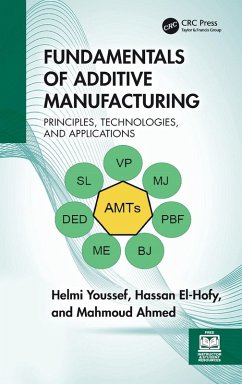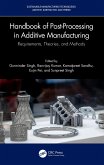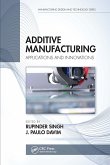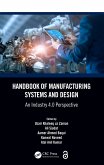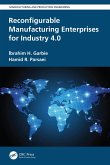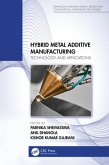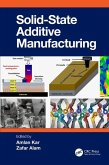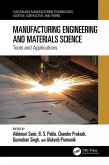Helmi Youssef, Hassan El-Hofy, Mahmoud Ahmed
Fundamentals of Additive Manufacturing
Principles, Technologies, and Applications
Helmi Youssef, Hassan El-Hofy, Mahmoud Ahmed
Fundamentals of Additive Manufacturing
Principles, Technologies, and Applications
- Gebundenes Buch
- Merkliste
- Auf die Merkliste
- Bewerten Bewerten
- Teilen
- Produkt teilen
- Produkterinnerung
- Produkterinnerung
Additive manufacturing (AM) is the process of constructing 3D objects from a computer model by depositing successive layers of material. The benefits include reduced material wastage and decreased human intervention. This book provides a comprehensive overview of AM techniques, including their concepts, features, and historical background.
Andere Kunden interessierten sich auch für
![Handbook of Post-Processing in Additive Manufacturing Handbook of Post-Processing in Additive Manufacturing]() Handbook of Post-Processing in Additive Manufacturing217,99 €
Handbook of Post-Processing in Additive Manufacturing217,99 €![Additive Manufacturing Additive Manufacturing]() Additive Manufacturing71,99 €
Additive Manufacturing71,99 €![Handbook of Manufacturing Systems and Design Handbook of Manufacturing Systems and Design]() Handbook of Manufacturing Systems and Design217,99 €
Handbook of Manufacturing Systems and Design217,99 €![Reconfigurable Manufacturing Enterprises for Industry 4.0 Reconfigurable Manufacturing Enterprises for Industry 4.0]() Ibrahim H. GarbieReconfigurable Manufacturing Enterprises for Industry 4.0195,99 €
Ibrahim H. GarbieReconfigurable Manufacturing Enterprises for Industry 4.0195,99 €![Hybrid Metal Additive Manufacturing Hybrid Metal Additive Manufacturing]() Hybrid Metal Additive Manufacturing175,99 €
Hybrid Metal Additive Manufacturing175,99 €![Solid State Additive Manufacturing Solid State Additive Manufacturing]() Solid State Additive Manufacturing175,99 €
Solid State Additive Manufacturing175,99 €![Manufacturing Engineering and Materials Science Manufacturing Engineering and Materials Science]() Manufacturing Engineering and Materials Science217,99 €
Manufacturing Engineering and Materials Science217,99 €-
-
-
Additive manufacturing (AM) is the process of constructing 3D objects from a computer model by depositing successive layers of material. The benefits include reduced material wastage and decreased human intervention. This book provides a comprehensive overview of AM techniques, including their concepts, features, and historical background.
Hinweis: Dieser Artikel kann nur an eine deutsche Lieferadresse ausgeliefert werden.
Hinweis: Dieser Artikel kann nur an eine deutsche Lieferadresse ausgeliefert werden.
Produktdetails
- Produktdetails
- Verlag: CRC Press
- Seitenzahl: 452
- Erscheinungstermin: 6. September 2024
- Englisch
- Abmessung: 240mm x 161mm x 29mm
- Gewicht: 840g
- ISBN-13: 9781032582634
- ISBN-10: 1032582634
- Artikelnr.: 70150821
- Herstellerkennzeichnung
- Libri GmbH
- Europaallee 1
- 36244 Bad Hersfeld
- gpsr@libri.de
- Verlag: CRC Press
- Seitenzahl: 452
- Erscheinungstermin: 6. September 2024
- Englisch
- Abmessung: 240mm x 161mm x 29mm
- Gewicht: 840g
- ISBN-13: 9781032582634
- ISBN-10: 1032582634
- Artikelnr.: 70150821
- Herstellerkennzeichnung
- Libri GmbH
- Europaallee 1
- 36244 Bad Hersfeld
- gpsr@libri.de
Professor Helmi A. Youssef founded his scientific school in both Traditional and Non-traditional Machining Technologies based on several research and educational laboratories he built. In the early 1970s, he established the first NTM research laboratory at Alexandria University. Since that time, he carried out intensive research in his fields of specialization and supervised many Ph.D. and M. Sc. theses. Professor Youssef has organized and participated in many international conferences. He has published many scientific papers in specialized journals and authored many books in his fields of specialization, two of which are singly authored. Currently, Professor Youssef is an emeritus Professor in PED, at Alexandria University. His work involves developing courses and conducting research in the areas of metal cutting and nontraditional machining. Professor Hassan El-Hofy has published over 90 scientific and technical papers and has supervised many graduate students in advanced machining. He serves as a consulting editor for many international journals and is a regular participant in many international conferences. Between August 2007, and July 2010 he was the chairperson of the Department of Production Engineering, AU. In October 2011 he was selected as the Vice Dean for Education and Student Affairs College of Engineering, AU. Between December 2012 and February 2018, he was the Dean of the Innovative Design Engineering (IDE) School at the Egypt-Japan University of Science and Technology (E-JUST) in Alexandria, Egypt. He worked as an acting Vice President of Research from December 2014 to April 2017 at E-JUST. Currently, he is a professor of machining technology at the Department of Industrial and Manufacturing Engineering (IME) at E-JUST, Egypt. Professor M. Hamed Ahmed constructed and taught numerous graduate and undergraduate courses in the general fields of materials and manufacturing, to name a few; Failure Analysis, Material Selection, Finite Element Analysis, Fracture Mechanics, Non-destructive Testing, Advanced Manufacturing Processes, Theory of Plasticity, Solid Mechanics, Die Design, Metal Forming, Metal Cutting, Non-conventional Machining, Welding Technology, Engineering Materials, and Manufacturing Technology. Professor Ahmed took part in establishing and developing laboratories in the same fields including The Material Technology Lab. (Alex. University), Material Testing, Forming Machines, CNC Machining, Metrology, and Electroplating Labs. (UAE University), as well as Non-conventional Machining, and CNC Machining Labs. (King Abdul-Aziz University, KSA). Over the years, Professor Ahmed has supervised numerous M.Sc. and Ph.D. degrees, covering the areas of Electro-Discharge Machining, Failure of Welded Joints, Extrusion of Fluted Sections, Plasma Cutting, Ultrasonic Machining, Pulsed Current MIG Welding, Compression of Tubular Sections, Forward Tube Spinning, Characterization of Engineering Materials Using Nodal Analysis, Selection of Non-Traditional Machining Processes, Thermo-mechanical Rolling, Functionally Graded Metal Matrix Composites, Manufacturing of Porous Metals and AM Assisted Manufacturing. Prof. Ahmed has a good track record of publishing in numerous national and international conferences and reputable journals. He also contributed to the development and improvement of industrial activities within Alexandria through consultations related to solving design and manufacturing problems, material and product inspection, failure analysis, plant layouts, feasibility and opportunity studies, as well as running crash and training courses in the relevant fields of interest.
1. Introduction to Additive Manufacturing. 2. Software Aspects for Additive
Manufacturing. 3. Basic Additive Manufacturing Techniques. 4. Technologies
of Additive Manufacturing of Polymers and Composites. 5. Technologies of
Additive Manufacturing of Metallic Materials. 6. Technologies for Additive
Manufacturing of Ceramics (AMC). 7. Feedstock Materials for Additive
Manufacturing Processes. 8. Post-Processing Techniques in Additive
Manufacturing Processes. 9. Design for Additive Manufacturing. 10. Impact
of Additive Manufacturing on Conventional Manufacturing Processes. 11.
Manufacturing Cost of Additive Manufacturing. 12. Environmental and Health
Impacts of Additive Manufacturing. 13. Fields of Application of Additive
Manufacturing. 14. Additive Manufacturing Characterization, Challenges and
Needs, Future Trends and Final Recommendations. 15. Additive Manufacturing
Case Studies.
Manufacturing. 3. Basic Additive Manufacturing Techniques. 4. Technologies
of Additive Manufacturing of Polymers and Composites. 5. Technologies of
Additive Manufacturing of Metallic Materials. 6. Technologies for Additive
Manufacturing of Ceramics (AMC). 7. Feedstock Materials for Additive
Manufacturing Processes. 8. Post-Processing Techniques in Additive
Manufacturing Processes. 9. Design for Additive Manufacturing. 10. Impact
of Additive Manufacturing on Conventional Manufacturing Processes. 11.
Manufacturing Cost of Additive Manufacturing. 12. Environmental and Health
Impacts of Additive Manufacturing. 13. Fields of Application of Additive
Manufacturing. 14. Additive Manufacturing Characterization, Challenges and
Needs, Future Trends and Final Recommendations. 15. Additive Manufacturing
Case Studies.
1. Introduction to Additive Manufacturing. 2. Software Aspects for Additive
Manufacturing. 3. Basic Additive Manufacturing Techniques. 4. Technologies
of Additive Manufacturing of Polymers and Composites. 5. Technologies of
Additive Manufacturing of Metallic Materials. 6. Technologies for Additive
Manufacturing of Ceramics (AMC). 7. Feedstock Materials for Additive
Manufacturing Processes. 8. Post-Processing Techniques in Additive
Manufacturing Processes. 9. Design for Additive Manufacturing. 10. Impact
of Additive Manufacturing on Conventional Manufacturing Processes. 11.
Manufacturing Cost of Additive Manufacturing. 12. Environmental and Health
Impacts of Additive Manufacturing. 13. Fields of Application of Additive
Manufacturing. 14. Additive Manufacturing Characterization, Challenges and
Needs, Future Trends and Final Recommendations. 15. Additive Manufacturing
Case Studies.
Manufacturing. 3. Basic Additive Manufacturing Techniques. 4. Technologies
of Additive Manufacturing of Polymers and Composites. 5. Technologies of
Additive Manufacturing of Metallic Materials. 6. Technologies for Additive
Manufacturing of Ceramics (AMC). 7. Feedstock Materials for Additive
Manufacturing Processes. 8. Post-Processing Techniques in Additive
Manufacturing Processes. 9. Design for Additive Manufacturing. 10. Impact
of Additive Manufacturing on Conventional Manufacturing Processes. 11.
Manufacturing Cost of Additive Manufacturing. 12. Environmental and Health
Impacts of Additive Manufacturing. 13. Fields of Application of Additive
Manufacturing. 14. Additive Manufacturing Characterization, Challenges and
Needs, Future Trends and Final Recommendations. 15. Additive Manufacturing
Case Studies.

